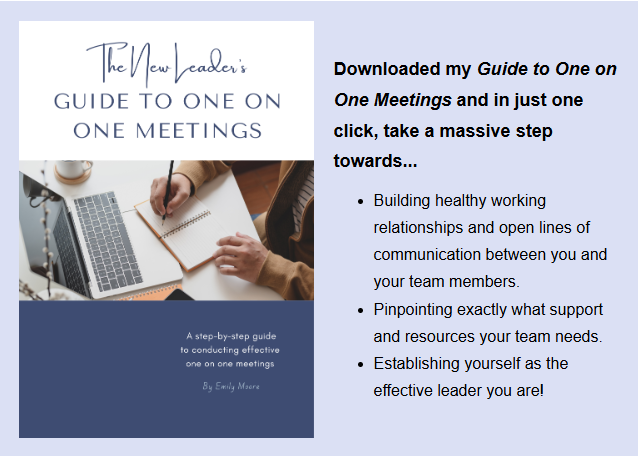
4 Key Areas you Need to Focus on as a New Manager
Jul 26, 2024I'm often asked questions by new managers about what they should focus on when they're new. What are their priorities in those first 30 days. And it’s a great question!
And while at this point in my career, it's easy for me to rattle off exactly what to pour your energy into for the first 30 days, I know from the perspective of a first-time manager it's not always that clear.
Often in your first weeks you are either given an overwhelming amount of information and it’s not clear what you should focus on, or you are given an underwhelming amount of information and it’s not clear what you should focus on.
Neither is ideal and neither really highlights your priorities.
Sure, you need to know what the various departments do, the vacation policy, and the history of the office problem child. But that’s not going to help you establish yourself as a leader and start off on the right track.
There have been more than a few times I have started a management position where I was shown my desk and basically had a massive stack of policies, procedures, general company info land with a loud thump on my desk.
Did I need to know this information? Yes, absolutely. Is it priority over getting to know my new team? Absolutely not.
After plenty of misused time early on and coaching other managers on where to focus their attention, I can confidently say if I were starting over again, these are the areas I would focus on.
No. 1
Get in the Right Frame of Mind
"No man will make a great leader who wants to do it all himself, or to get all the credit for doing it."
— Andrew Carnegie
Mindset is everything! And like most things in life, your mindset will play a huge role in whether you make it as a leader or not.
You want to approach your new role as a leader with the understanding that your number one job is to ensure your team has everything they need to perform their job effectively and to ensure they are in a environment where they are able to learn and grow professionally.
Being a leader is about listening to what your team needs to succeed and ensuring they get it, whether that’s support, resources, training, or tools.
Being a leader is not about getting all the fame for a job well done or telling others what to do. Go into this new chapter with humility, curiosity, and the willingness to learn, not like you have all the answers…because you don’t 😊
No. 2
Get Clarity
"A leader is one who knows the way, goes the way, and shows the way."
-John Maxwell
You will need to know the direction you are going to lead your team successfully.
Make sure you have very clear direction and expectations from your manager as to what is expected of you and what is expected of your new team. You want to make sure you have a solid understanding of your department and company goals, KPIs, and any other deliverables.
Being able to clearly define and communicate your expectations is critical to your team’s success and will have a direct impact on their ability to meet their goals.
No. 3
Get Organized
"For every minute spent organizing, an hour is earned."
- Benjamin Franklin
Can you be a great leader and be disorganized at the same time? I think so? Probably. I don’t think it would work for me.
With a major increase in your workload and responsibilities, I have seen disorganization happen very quickly with new managers and be a major source of stress for them and by extension their teams. In those early days find a way to organize your task list, employee notes/requests, any admin tasks, etc. You will also want to set up your files and calendar in a way that works for you.
Carve out a little time early on and set yourself up for success. It will pay off down the road.
No. 4
Get to Know Your Team
"Leadership is not about being in charge. It is about taking care of those in your charge."
- Simon Sinek
This is my favourite one! And it really can’t be stressed enough just how important this is.
You will want to get to know your team and what they do. Take the time to get to know your team and what they do and start to build a genuine relationship with each of them.
Your initial meetings with your team members should be focused on getting to know them before diving into the details of the work they do, the support they need, and your expectations of them. Start to get to know them by asking a few non-invasive personal questions. Yes, you can ask personal questions (but not too personal, obviously). This may look like asking about hobbies and interests outside of work, family/friends, where they’re from, etc. Then you can start to get to know the professional version of team members.
If one on one meetings aren’t already in place, then this is a great opportunity to make a positive first impression by implementing them. These meetings will give you a wealth of information and ultimately help you lead your team more effectively.
Check out my YouTube videos here and here for more on one-on-one meetings.
Now it goes without saying that you will obviously have to shift your focus to other areas during your onboarding. But in that valuable time period when you are new, making a first impression, and establishing yourself as a leader, ask yourself if what you are focusing your time and energy on is serving any of these 4 key areas.
Once you have an understanding of these areas you will have a solid foundational to start building your team and making an impact as a leader.



